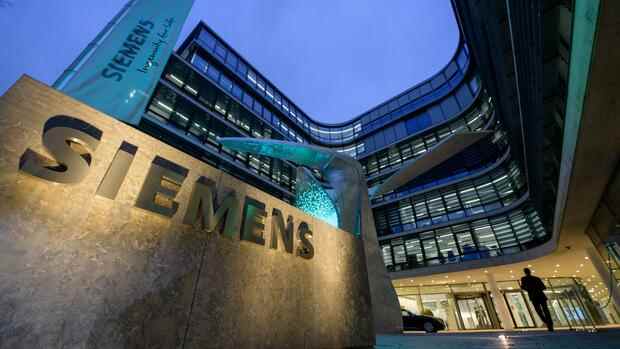On Monday, workers in Munich demonstrate against the possible sale of the business with large drives.
(Photo: dpa)
Munich After the spin-off of energy technology last year, Siemens CEO Roland Busch actually wants to keep the remaining group together to a large extent. But there is still a large possible sales candidate: the business with the large drives with around 7000 employees.
Before the supervisory board meeting on Wednesday, the employees are now mobilizing against a possible sale. A protest demonstration in front of the headquarters is planned for Monday. “We call for the decision to become independent to be reviewed again,” said Siemens Supervisory Board member Hagen Reimer to Handelsblatt.
The geopolitical situation has changed fundamentally since the decision last year. The promotion of raw materials such as rare earths has gained strategic importance.
The Large Drive Applications (LDA) division, for example, produces engines for use in mines, but according to company circles, it also produces drives on a smaller scale that are used in submarines. In view of the problems in the supply chains and the geopolitical upheavals, Siemens’ business had to be reassessed, Reimer demanded. “The question is whether you want to give something like this out of your hands at this time.”
Top jobs of the day
Find the best jobs now and
be notified by email.
The activities no longer really fit the new profile as an IT and technology group and are therefore no longer part of the core business. That’s why Siemens announced last year that it would become independent. This is often the first step to a sale.
A Siemens spokesman referred to last year’s decision. It continues to apply that LDA needs more flexibility and independence. In industry circles it was emphasized that a sale was not yet a decided thing, but just one of many options.
The plans are causing concern in the affected plants. The tradition-steeped dynamo plant in Berlin faced closure years ago, but was then saved. Plants in Erlangen and Ruhstorf are also affected. The group wants to phase out production in Ruhstorf anyway.
At the demonstration on Wittelsbacher Platz in Munich on Monday, workers expect a three-digit number of participants. This puts the relationship between Busch and the employees, which both sides have rated as constructive, to the test.
The big drives are the largest remaining chunk among the so-called portfolio companies (pocs), which are no longer counted as part of the core business. In February, Busch had already announced the sale of postal and parcel automation to the Körber Group for 1.15 billion euros. In addition, the shares in an electric motor joint venture went to the French partner Valeo.
This completes the sales list to a large extent. According to insiders, the large units such as the train technology division Mobility should continue to belong to the group of companies. A further split is not planned by Busch. In the last major step of his corporate restructuring, predecessor Joe Kaeser spun off energy technology as Siemens Energy and listed it on the stock exchange.
More: Siemens Healthineers raise the forecast again
